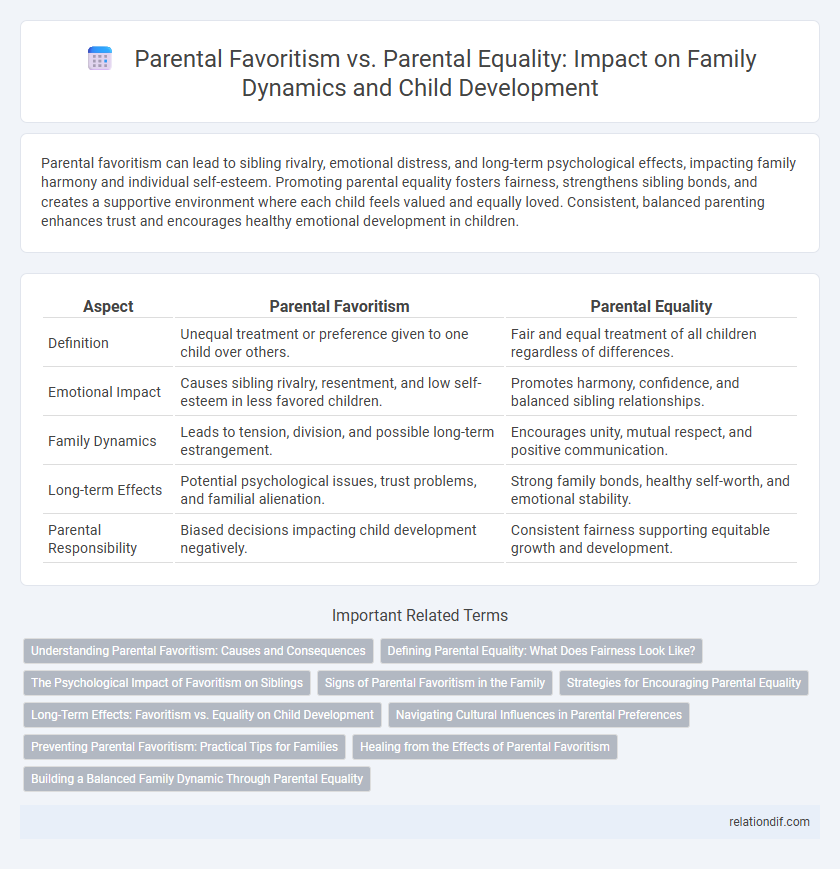Parental favoritism can lead to sibling rivalry, emotional distress, and long-term psychological effects, impacting family harmony and individual self-esteem. Promoting parental equality fosters fairness, strengthens sibling bonds, and creates a supportive environment where each child feels valued and equally loved. Consistent, balanced parenting enhances trust and encourages healthy emotional development in children.
Table of Comparison
| Aspect | Parental Favoritism | Parental Equality |
|---|---|---|
| Definition | Unequal treatment or preference given to one child over others. | Fair and equal treatment of all children regardless of differences. |
| Emotional Impact | Causes sibling rivalry, resentment, and low self-esteem in less favored children. | Promotes harmony, confidence, and balanced sibling relationships. |
| Family Dynamics | Leads to tension, division, and possible long-term estrangement. | Encourages unity, mutual respect, and positive communication. |
| Long-term Effects | Potential psychological issues, trust problems, and familial alienation. | Strong family bonds, healthy self-worth, and emotional stability. |
| Parental Responsibility | Biased decisions impacting child development negatively. | Consistent fairness supporting equitable growth and development. |
Understanding Parental Favoritism: Causes and Consequences
Parental favoritism arises from factors including parental stress, child temperament, or unconscious biases, often leading to unequal emotional support and resources among siblings. This preferential treatment can contribute to sibling rivalry, diminished self-esteem in less favored children, and increased family conflict. Understanding these causes and consequences is essential for promoting parental equality and fostering healthier family dynamics.
Defining Parental Equality: What Does Fairness Look Like?
Parental equality means distributing attention, resources, and support evenly among children to ensure each child feels valued and respected. Fairness in parenting involves recognizing individual needs while maintaining balanced involvement and consistent discipline. Establishing clear communication and setting equitable expectations promote a sense of justice and emotional security within the family.
The Psychological Impact of Favoritism on Siblings
Parental favoritism significantly affects siblings' psychological well-being, often leading to feelings of jealousy, decreased self-esteem, and long-term emotional distress in non-favored children. Studies reveal that perceived inequality in parental attention fosters sibling rivalry and undermines healthy family relationships. Equal parental treatment promotes balanced emotional development and strengthens sibling bonds, reducing the risk of anxiety and depression.
Signs of Parental Favoritism in the Family
Signs of parental favoritism in the family often include unequal attention, praise, or resources directed toward one child over others, leading to feelings of resentment and competition among siblings. Observable behaviors may consist of consistently calling on a favored child for help, offering more leniency in discipline, or prioritizing their achievements and needs. Subtle forms of favoritism also manifest through differential emotional support, such as showing more affection or empathy toward one child, which can impact family dynamics and individual self-esteem.
Strategies for Encouraging Parental Equality
Implementing consistent rules and expectations for all children fosters parental equality by reducing perceptions of favoritism. Practicing active listening and validating each child's feelings promotes fairness and emotional security. Parents can also rotate responsibilities and privileges to ensure balanced attention and support across siblings.
Long-Term Effects: Favoritism vs. Equality on Child Development
Parental favoritism often leads to long-term emotional challenges, including lower self-esteem and increased sibling rivalry, which can hinder healthy social development in children. In contrast, parental equality fosters a stable environment that promotes balanced emotional growth and stronger sibling relationships. Research indicates that children raised with equal parental attention are more likely to develop resilience, emotional intelligence, and positive peer interactions over time.
Navigating Cultural Influences in Parental Preferences
Parental favoritism often stems from deeply rooted cultural norms that prioritize specific traits or achievements, influencing parents to unconsciously favor certain children. Navigating these cultural influences requires awareness of inherent biases and implementing equitable parenting strategies that value each child's unique strengths. Emphasizing parental equality fosters stronger family bonds, reduces sibling rivalry, and promotes emotional well-being for all children.
Preventing Parental Favoritism: Practical Tips for Families
Preventing parental favoritism requires consistent communication and setting clear, equitable boundaries for all children to foster a balanced family environment. Parents should actively recognize and celebrate each child's unique strengths and needs to avoid bias and promote individual self-esteem. Implementing regular family discussions and rotating responsibilities can help ensure fairness and reduce sibling rivalry.
Healing from the Effects of Parental Favoritism
Healing from the effects of parental favoritism involves acknowledging the emotional wounds caused by unequal treatment and fostering open communication within the family. Therapeutic interventions, such as family counseling, help rebuild trust and promote understanding between parents and children, encouraging a shift toward parental equality. Consistent efforts to validate each child's unique value and experiences are essential for restoring balance and emotional well-being.
Building a Balanced Family Dynamic Through Parental Equality
Parental equality fosters a balanced family dynamic by ensuring that all children receive equal attention, support, and love, which promotes healthy emotional development and reduces sibling rivalry. Research indicates that perceived favoritism can lead to long-term resentment and behavioral issues, while equitable parenting strengthens family bonds and communication. Implementing consistent rules and nurturing each child's unique strengths helps create a harmonious environment where every member feels valued.
Parental favoritism vs Parental equality Infographic

 relationdif.com
relationdif.com